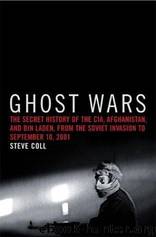Ghost Wars: The Secret History of the CIA, Afghanistan, and Bin Laden, from the Soviet Invasion to September 10, 2001 by Steve Coll

Author:Steve Coll
Language: eng
Format: mobi
Tags: Afghanistan, International Relations, Political Freedom & Security, Intelligence, Political, Asia, General, Political Science, Central Asia, Biography & Autobiography, Terrorism, History
ISBN: 9781594200076
Publisher: Penguin Books
Published: 2004-02-23T08:42:12.371000+00:00
BY THE AUTUMN OF 1997 persistent lobbying against the Taliban by the Feminist Majority had influenced the two most important women in the Clinton administration, Madeleine Albright and Hillary Clinton. When Albright visited a refugee camp in Peshawar that November, she departed from her prepared script and denounced the Taliban’s policies toward women as “despicable.” It was the first time a Clinton Cabinet member had made such a forceful statement about Taliban human rights violations. A few weeks later Hillary Clinton used a major speech about human rights at the United Nations to single out the Taliban. “Even now the Taliban in Afghanistan are blocking girls from attending schools,” Clinton said. The Taliban were harassing those “who would speak out against this injustice.” It was the first time that either of the Clintons had seriously criticized the Taliban in public.24
The impetus had come from old friends of Albright and Hillary Clinton in the feminist policy networks of the Democratic Party. These were accomplished, professional women of the baby boomer generation now stepping into powerful positions that women had not held in Washington before, at least not in these numbers. They kept in touch with one another and worked each other’s issues. The Taliban had now slipped onto the agenda of this fax machine network. Sitting cross-legged in their barren ministries thousands of miles away in Kandahar, the Taliban’s leaders had no idea where this turn in American attitudes had come from. They made little effort to find out.When pressed on the issue of education for girls by the occasional visiting American delegation, they said, “This is God’s law,” recalled the State Department’s Leonard Scensny. “This is the way it’s supposed to be. Leave us alone.”25
Despite the loss of their embassy in Washington, Massoud’s closest aides pressed their worldwide lobbying campaign to rally support for their war against the Taliban. In Washington that fall, Abdullah, now officially deputy foreign minister in Massoud’s rump government, told State Department officials that bin Laden was financing the Taliban. He tried to persuade the handful of Afghan experts he met at Foggy Bottom that the Taliban should be seen as part of a regional network of Islamist radicalism funded by bin Laden and other wealthy Persian Gulf sheikhs.
In comments such as Albright’s, Abdullah could see “signs of some change” in American attitudes, but at the working level of the State Department, all he heard about was the need for Massoud to negotiate with the Taliban. There seemed little belief that the Taliban posed a serious threat. Most of all, “what was lacking there was a policy,” Abdullah recalled. The path of least resistance at the State Department was “to accept the presence of the Taliban as a reality” in Afghanistan and try to negotiate solutions “through Pakistan,” as Abdullah recalled it. On the American side, “We wanted to see if there was a way to bring about a peaceful settlement of the continuing civil war,” remembered Karl F. “Rick” Inderfurth, then assistant secretary of state for South Asian affairs.
Download
This site does not store any files on its server. We only index and link to content provided by other sites. Please contact the content providers to delete copyright contents if any and email us, we'll remove relevant links or contents immediately.
| Arms Control | Diplomacy |
| Security | Trades & Tariffs |
| Treaties | African |
| Asian | Australian & Oceanian |
| Canadian | Caribbean & Latin American |
| European | Middle Eastern |
| Russian & Former Soviet Union |
The Secret History by Donna Tartt(16645)
The Social Justice Warrior Handbook by Lisa De Pasquale(11492)
Thirteen Reasons Why by Jay Asher(7797)
This Is How You Lose Her by Junot Diaz(5791)
Weapons of Math Destruction by Cathy O'Neil(5045)
Zero to One by Peter Thiel(4832)
The Myth of the Strong Leader by Archie Brown(4795)
Promise Me, Dad by Joe Biden(4453)
Beartown by Fredrik Backman(4429)
Stone's Rules by Roger Stone(4421)
How Democracies Die by Steven Levitsky & Daniel Ziblatt(4407)
The Fire Next Time by James Baldwin(4349)
100 Deadly Skills by Clint Emerson(4084)
A Higher Loyalty: Truth, Lies, and Leadership by James Comey(4038)
Rise and Kill First by Ronen Bergman(4017)
The David Icke Guide to the Global Conspiracy (and how to end it) by David Icke(3890)
The Farm by Tom Rob Smith(3878)
Secrecy World by Jake Bernstein(3787)
The Doomsday Machine by Daniel Ellsberg(3736)
